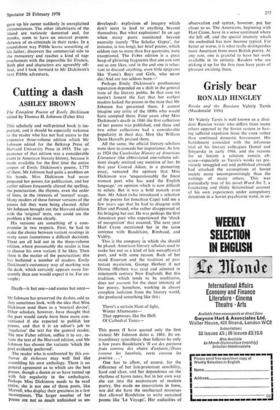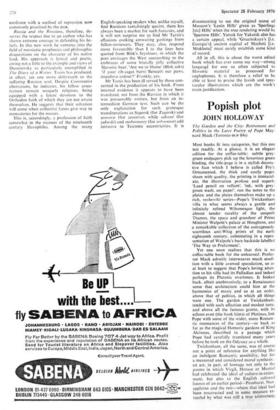Grisly bear
RONALD HINGLEY
Russia and the Russians Valeriy Tarsis (Macdonald 100s)
Mr Valeriy Tarsis is well known as a dissi- dent Russian writer who differs from many others opposed to the Soviet system in hav- ing suffered expulsion from the USSR rather than continued domestic harassment. His banishment coincided with the infamous trial of his literary colleagues Daniel and Sinyaysky in early 1966, and the reasons for so lenient a solution remain ob- scure—especially as Tarsis's works (as pre- viously smuggled out and published abroad) had attacked the assumptions of Soviet society more uncompromisingly than the writings of many others. This was particularly true of his novel Ward No 7, a fascinating and thinly fictionalised account of his own experiences under compulsory detention in a Soviet psychiatric ward, in ac- cordance with a method of repression now commonly practised by the KGB.
Russia and the Russians, therefore, de- serves the respect due to an author who has shown extreme courage in defending his be- liefs. In this new work he ventures into the field of messianic prophecies and philosophic disquisitions on the character of his native land. His approach is lyrical and poetic, owing not a little to the example and views of Dostoievsky as particularly exemplified in The Diary of a Writer. Tarsis has produced, in effect, yet one more dithyramb to the suffering Russian soul. Despite Communist aberrations, he indicates, his fellow coun- trymen remain uniquely religious, being equipped with a latent devotion to the Orthodox faith of which they are not aware themselves. He suggests that their salvation will come when collective farms give way to monasteries for the masses.
This is, accordingly, a profession of faith somewhat in the manner of the nineteenth century Slavophiles. Among the many English-speaking readers who, unlike myself, find Russians tantalisingly quaint, there has always been a market for such fantasies, and it will not surprise me to find Mr Tarsis's effusions evoking answering gushings from fellow-reviewers. They may, also, respond more favourably than I to the lines here quoted from Blok's Scythians, in which the poet envisages the West succumbing to the embraces of some brutally jolly collective Slavonic bear. 'Are we to blame' (Blok asks) 'if your rib-cages burst/Beneath our paws, impulsive ardour?' Frankly, yes. Mr Tarsis has been ill served by those con- cerned in the production of his book. From internal evidence it appears to have been translated, not from the Russian in which it was presumably written, but from an in- termediate German text. Such can be the only explanation for such grotesque transliterations as Sagorsk (for Zagorsk) and sem.stvo (for zetnstvo), while sakussi (for zakuski) and ssobornosty (for sobornost) add intrusive to Teutonic eccentricities. It is disconcerting to see the original name of Moscow's 'Lenin Hills' given as 'Sperling% [sic] Hills' when the true rendering would be `Sparrow Hills'. Yatusk for Yakutsk also has a certain appeal, while `Gruzinskaya's [i.e. Georgia's] ancient capital of Mzcheti [i.e. Mtskheta]' must surely establish some kind of record.
All in all, this is about the worst edited book which has ever come my way—strong language for one so often subjected to Slavonic material as processed for anglophones. It is therefore a relief to be able at least to praise the lavish and spec- tacular illustrations which are the work's main justification.



































 Previous page
Previous page